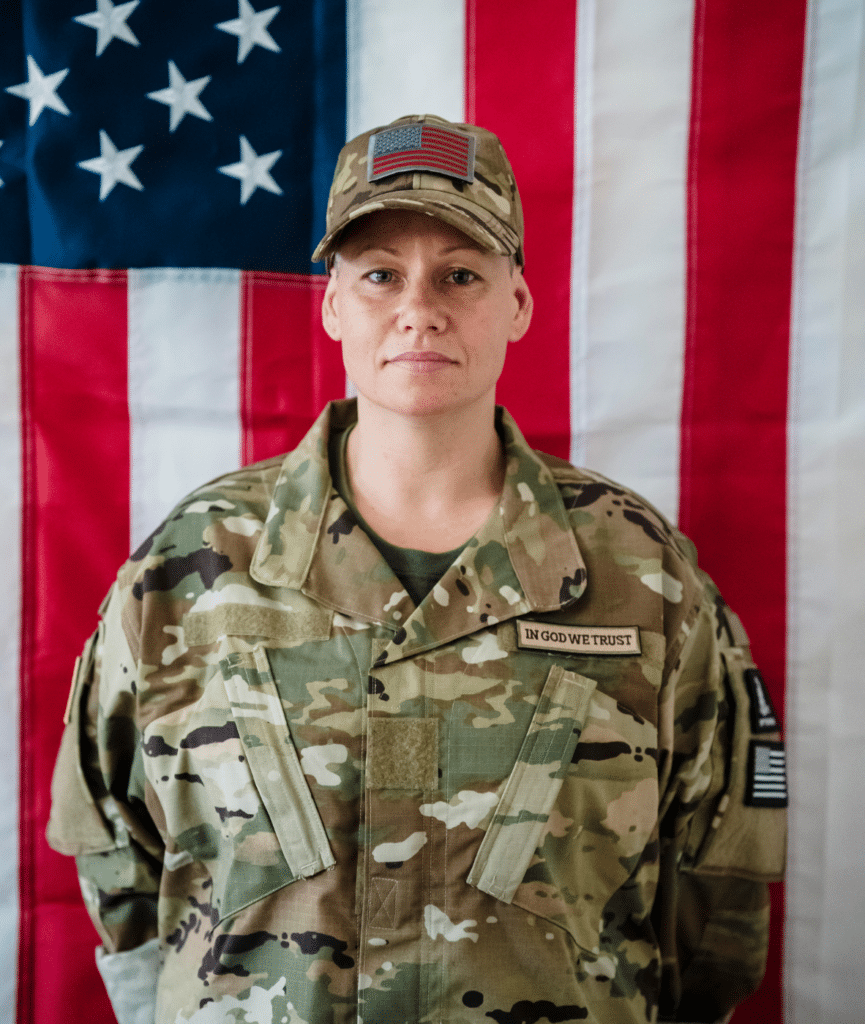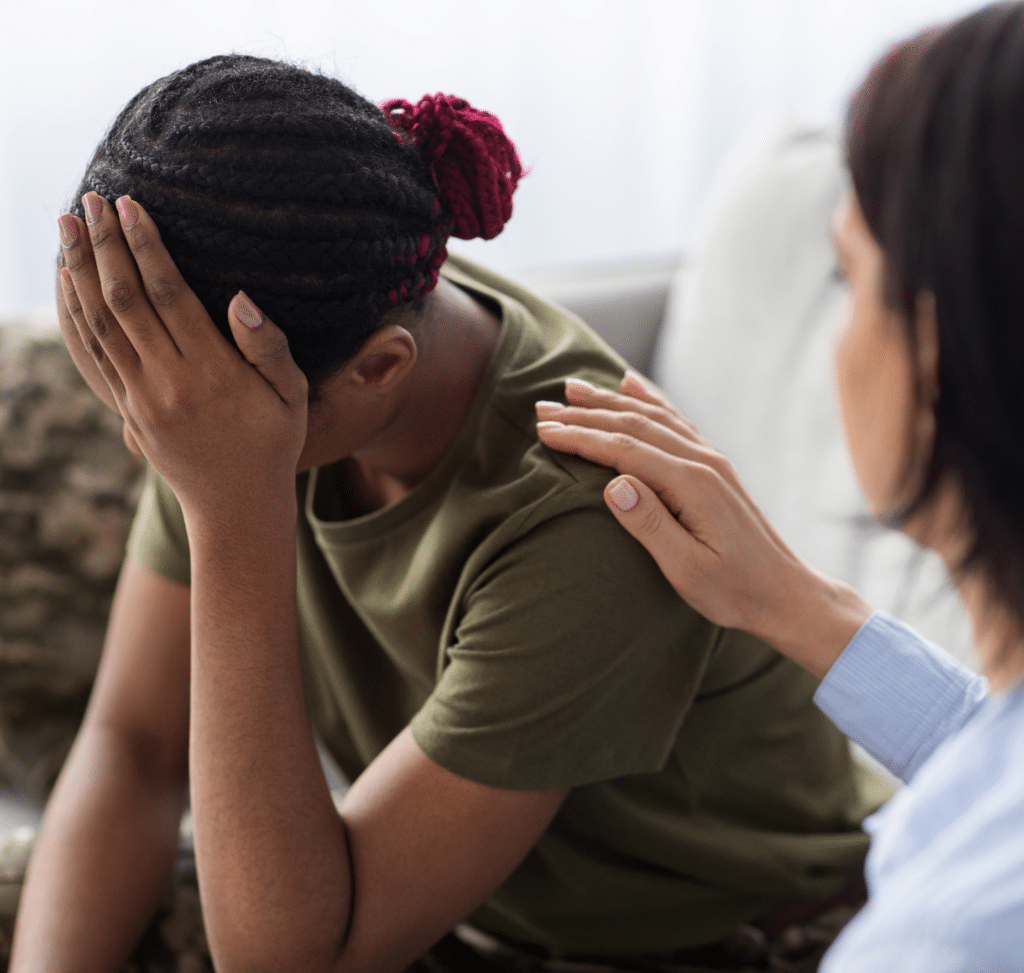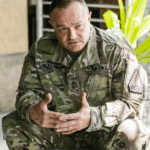Military Sexual Trauma (MST) in Veterans

A recent study estimates that around 16% of military personnel and veterans have experienced MST.1 Military sexual trauma doesn’t discriminate by rank, job title, or time served. It can happen to anyone, and the emotional, physical, and psychological effects are life-altering.
On this page, we discuss what MST is, how deeply it affects those who experience it, and, most importantly, what support and care systems are available.

What Is Military Sexual Trauma in Veterans?
MST includes a whole range of experiences, some subtle, others overtly violent. No one should ever have to endure these, let alone in a space that’s supposed to be about duty and honor.
Some examples of MST are:
Experiencing unwanted sexual advances that made you feel unsafe.- Receiving sexual comments about your body or behavior.
- Being touched, groped, or grabbed in ways that made you uncomfortable, even if under the guise of jokes or hazing rituals.
- Being physically overpowered or forced into sexual acts against your will.
- Being involved in sexual situations without the ability to give consent, such as when you were intoxicated, drugged, or asleep.
- Being manipulated or pressured into sexual activity, for example, through threats of punishment if you didn’t comply or promises of rewards if you did.3
Unlike civilian spaces, the military is a closed system. You’re expected to rely on the very people who may become perpetrators. When MST happens, victims often stay quiet out of fear of career damage, of not being believed, or worse, fear of becoming a target again.
The Impact of Military Sexual Trauma on the Mental Health of Veterans
Military service is often described as a brotherhood. You train together, eat together, serve together, and in many cases, risk your life together. That level of camaraderie is built on trust.
When that trust is violated by something as deeply personal and traumatic as MST, the ripple effect hits every part of a veteran’s life, long after the uniform comes off.
Some veterans experience intense emotional distress right away, while others suppress it for years, sometimes decades, before it surfaces.
MST and Mental Health Disorders
Depression: Symptoms of depression, like low mood, loss of interest, fatigue, hopelessness, and suicidal thoughts, become part of daily life for some survivors.- Anxiety Disorders: Veterans may experience generalized anxiety, panic attacks, constant hyper-awareness, or an unshakable feeling of being “on edge” or “not safe.”
- Emotional Numbness: Many survivors describe feeling emotionally detached from themselves or the world around them, as if they’re watching life from the outside, rather than living in it.
- Anger and Irritability: The simmering rage or irritability in veterans can be the result of unresolved trauma, compounded by years of feeling unheard or unsafe.
Not everyone develops a mental health condition after MST. People respond in different ways. But even those who seem “fine” on the outside may be grappling with deep emotional scars.
Post-Traumatic Stress Disorder (PTSD) and Military Sexual Trauma
PTSD symptoms in MST survivors include:5
Flashbacks and intrusive memories of the assault or harassment.- Nightmares that disrupt sleep and leave the survivor feeling like they’ve relived the trauma.
- Avoidance behaviors. Examples include not wanting to go to certain places, see certain people, or talk about anything that may bring the event to mind.
- Constantly scanning for danger and difficulty relaxing even in safe environments.
- Emotional reactivity, such as startling easily, mood swings, or overwhelming fear or anger.
Some MST survivors do not even realize they have PTSD. Instead, they label themselves as just “bad at relationships” or “not cut out for civilian life,” when in reality, they’re responding to deep, unprocessed trauma.
How to File a Disability Compensation Claim Related to MST
You also have the right to file a claim if any of your health conditions, mental or physical, were caused or worsened by MST, including:
PTSD or other anxiety disorders- Depression or mood disorders
- Sexual dysfunction
- Long-term pain
- Gastrointestinal problems
Where to File a Claim for MST?
There are four main ways to file an MST disability claim:
- Online through the VA.gov website
- By mail. Fill out VA Form 21-526EZ and send it to:
Department of Veterans Affairs
Claims Intake Center
PO Box 4444
Janesville, WI 53547-4444
- In person at your nearest VA regional office
- With help from a trained advocate, such as a Veterans Service Officer (VSO), MST outreach coordinator, or an accredited representative. Every VA regional office has both a male and female MST outreach coordinator who specializes in helping survivors file these claims.
What Kind of Evidence Is Needed for an MST Claim?
Many MST cases don’t have formal documentation. The VA recognizes this and accepts a wide range of supporting evidence, direct and indirect.
Direct evidence includes:
- Service treatment records or personnel files mentioning the MST
- Chaplain or counselor reports
- Civilian medical or police reports
- Notes from rape crisis centers or domestic violence shelters
- Personal journals or letters written at the time
Indirect or “marker” evidence could be:
- Sudden drop in work performance
- Disciplinary actions or a request for transfer
- Panic attacks, depression, or isolation after the MST
- Intimacy struggles, or relationship fallout
- Eating changes
- Financial instability
- Sexual health tests, pregnancy tests, or emergency room visits without clear explanations
What Happens After You File a Claim for MST?
Once your claim is submitted, you may be scheduled for a compensation and pension (C&P) exam. A VA clinician (often a psychologist or psychiatrist) will meet with you to assess how MST has affected your health.
You’ll be asked questions about your symptoms, history, and day-to-day impact. It’s okay if you don’t remember every detail. Just make sure to speak your truth. They are not there to judge, interrogate, or invalidate you. Their role is only to document your symptoms in a clinical way to support your claim.
If it helps, you can request a provider of the same sex. VA honors that request to make the process feel safer.
What if You Already Filed for an MST Claim and Were Denied?
If you filed a claim related to MST in the past and it was denied, you now have the option to request a decision review. It gives your claim a second chance, this time under more survivor-sensitive guidelines and better-trained processors.
To do this, reach out to a VA MST outreach coordinator at your regional office. They’ll walk you through the steps and help you gather any additional documentation or “markers” that could strengthen your case.
Resources and Support for MST Survivors
Recovering from military sexual trauma is complex and often not a straightforward journey. For many survivors, just acknowledging what happened can take years. Some feel anger, shame, numbness, or confusion. Others struggle with trust, relationships, and figuring out day-to-day life.
The good news is that there is a wide range of support, both within the VA system and outside of it, for veterans who have experienced MST. And for the record: You deserve support for your experiences.
VA Military Sexual Trauma Services
Every VA medical center has an MST coordinator, a trained staff member who’s your go-to for anything related to MST care. They understand the sensitivity of MST and connect you to care that you feel safe with. You can request to work with a clinician of a specific sex if that helps you feel more comfortable.
MST-related outpatient treatment is also available at every VA medical center and at many VA community-based outpatient clinics (CBOCs). These services may include:
- Psychological assessments and evaluations
- Medication management (if needed)
- Individual therapy with trauma-informed clinicians
- Group therapy options with other MST survivors
- Specialized programs for co-occurring conditions like substance use, anxiety, depression, or PTSD
The VA also offers residential (live-in) and inpatient treatment programs for MST survivors who are dealing with severe symptoms, co-occurring issues, or long-term trauma that hasn’t responded to outpatient care alone. These programs offer round-the-clock support with structured therapy schedules and peer connection in a safe environment.
If you’re not sure whether you’re ready for a VA hospital setting, you can consider vet centers. These are community-based and offer confidential counseling and support in a less clinical environment. The facilities at vet centers include MST-related mental health counseling, support groups, and help with navigating VA resources.
Also, you do not need to have officially reported the MST when it happened. There is no requirement for documentation or investigation records to access VA MST services. You also don’t need to be service-connected for MST-related issues to get free care.
Military Sexual Trauma Support Outside the VA
RAINN (Rape, Abuse & Incest National Network) operates the National Sexual Assault Hotline (1-800-656-HOPE). It offers confidential sexual trauma support 24/7, including chat options for those who aren’t ready to speak aloud. 7
Then, the gold standard for treating PTSD related to sexual trauma, whether inside or outside the VA, is trauma-focused therapy.8 Among the most effective forms are prolonged exposure (PE) and cognitive processing therapy (CPT). These therapies were originally developed for survivors of sexual violence in civilian settings and were later adapted for veterans.
Many licensed civilian therapists across the country are trained in these exact same methods. At Mission Connection, for example, we have mental health professionals trained specifically in treating veterans using these approaches. You can find out more about the top evidence-based therapies for veterans we offer here.
The alternatives to trauma-focused therapy for those who aren’t ready to talk about their painful memories yet include the non-trauma-focused therapies (nTFT). Present-centered therapy (PCT), interpersonal therapy (IPT), and stress inoculation training (SIT) all improve your current functioning and coping rather than revisiting trauma.9
Holistic mind-body approaches like trauma-sensitive yoga, mindfulness, and guided relaxation techniques have also shown promise in clinical settings, including VA-led experiments.10
How Mission Connection Supports Healing From MST
No one should ever have to experience the trauma of military sexual assault, but the reality is that many service members and veterans have. If that includes you or someone you care about, please know that you are not alone, and what happened was not your fault.
At Mission Connection, we are committed to providing trauma-informed, evidence-based care for those impacted by MST. We understand how complex the road to healing is, especially when the trauma occurred in a setting built on trust and duty. Our team is here to offer a safe, nonjudgmental space where your experiences are honored and your healing is prioritized.
Call us confidentially or get in touch online to ask questions or learn more about how we can support you.

References
- Wilson, L. C. (2016). The Prevalence of Military Sexual Trauma: A Meta-Analysis. Trauma, Violence, & Abuse, 19(5), 584–597. https://doi.org/10.1177/1524838016683459
- LII / Legal Information Institute. (2017). 38 U.S. Code § 1720D – Counseling and treatment for sexual trauma. https://www.law.cornell.edu/uscode/text/38/1720D
- U.S. Department of Veterans Affairs. (n.d.). Military Sexual Trauma – Mental Health. https://www.mentalhealth.va.gov/msthome/index.asp
- O’Brien, B. S., & Sher, L. (2013). Military sexual trauma as a determinant in the development of mental and physical illness in male and female veterans. International Journal of Adolescent Medicine and Health, 25(3), 269–274. https://doi.org/10.1515/ijamh-2013-0061
- Webermann, A. R., Gianoli, M. O., Rosen, M. I., Portnoy, G. A., Runels, T., & Black, A. C. (2024). Military sexual trauma-related posttraumatic stress disorder service-connection: Characteristics of claimants and award denial across gender, race, and compared to combat trauma. PLOS ONE, 19(1), e0280708–e0280708. https://doi.org/10.1371/journal.pone.0280708
- Veterans Affairs. (2023, September 26). Military sexual trauma and disability compensation. https://www.va.gov/resources/military-sexual-trauma-and-disability-compensation/
- RAINN. (2024). RAINN | The nation’s largest anti-sexual violence organization. Rainn.org. https://rainn.org/
- Bisson, J. I., Roberts, N. P., Andrew, M., Cooper, R., & Lewis, C. (2013). Psychological Therapies for Chronic post-traumatic Stress Disorder (PTSD) in Adults. Cochrane Database of Systematic Reviews, 12(12). https://doi.org/10.1002/14651858.cd003388.pub4
- Galovski, T. E., Street, A. E., Creech, S., Lehavot, K., Kelly, U. A., & Yano, E. M. (2022). State of the Knowledge of VA Military Sexual Trauma Research. Journal of General Internal Medicine, 37(S3), 825–832. https://doi.org/10.1007/s11606-022-07580-8
- Kelly, U., Haywood, T., Segell, E., & Higgins, M. (2021). Trauma-Sensitive Yoga for Post-Traumatic Stress Disorder in Women Veterans who Experienced Military Sexual Trauma: Interim Results from a Randomized Controlled Trial. The Journal of Alternative and Complementary Medicine, 27(S1), S-45-S-59. https://doi.org/10.1089/acm.2020.0417






